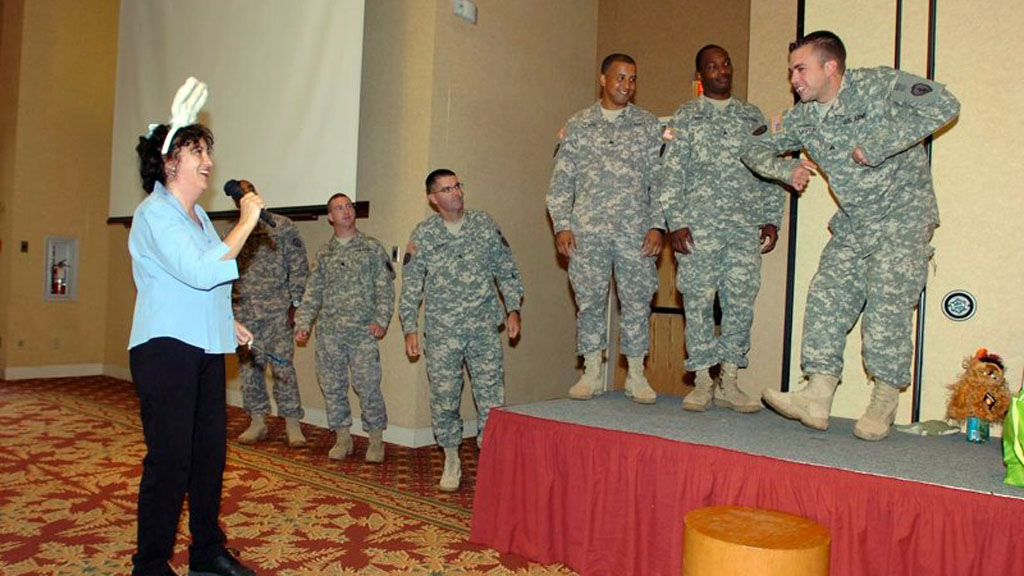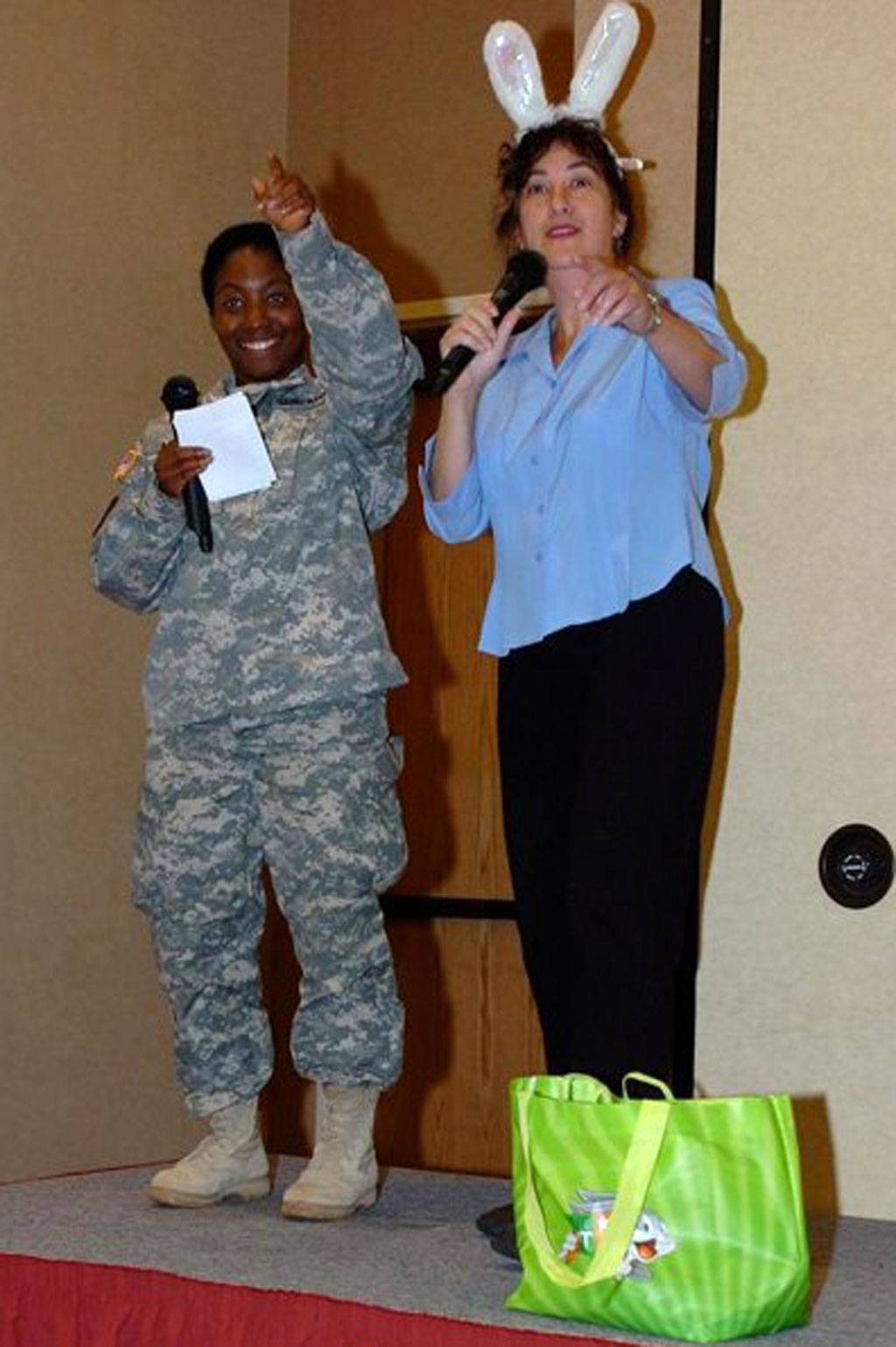How pretending to be a gorilla can help veterans with PTSD
Improv games are used in comedy shows all over the world. But they can also help veterans suffering the crippling anxiety disorder post-traumatic stress disorder (PTSD).

When Genie Joseph first met the ex-navy Seal with post-traumatic stress disorder (PTSD), he shouted in her face. The soldier, Steve, had previously been hospitalised for PTSD and his symptoms were tearing apart his wellbeing and his family, who refused to sit at the same table as him.
Steve was taking one of the classes that Ms Joseph gives to veterans and active duty service members with PTSD in Honolulu, Hawaii, and was displaying extreme versions of the aggression and irritability that can accompany PTSD.
“He was a navy Seal and a real tough guy,” Ms Joseph said, “and on the second day of class he came right up to me and stood right in front of me, like two inches from my nose, and screamed at me about something in a very loud voice, with a full eyeball stare. It was a really intimidating thing. But it was just something he wanted to communicate, he just wanted to change the date of a class. But that was just his style.”
Ms Joseph teaches classes on improv to veterans and troops in active service – games and techniques used for comedy shows in cities across the world. Her programme, Act Resilient, includes games like collaborative story-telling, finishing other people’s sentences, pretending to animals – a whole range of humour games from puns to goofy. One particularly helped Steve.
Ms Joseph taught him several techniques to change how he interacted with people, including a checklist about personal space and how to modify his communication tactics away from the battlefield. She also used a tool she created called “the emotional dial” to help him manage his emotions.
“One technique we talk about is the emotional dial. We introduce this concept of having a dial from zero to 10, with 10 being the most stressed and zero being fine. At any given moment you’re moving along the scale.
“But if you get yourself up to an eight, nine or 10, it’s very hard to pull yourself back down from that pitch.”
Steve came in at 11.
“The group was terrified of him. He would scare people from 30 feet away. So we explained to him that on that scale of one to 10 he was always an 11. And we’d make the hand signal for two when he was being too intense. And he’d wind it down.
“He taught his family this, and so when he was being too much at home they’d make the two signal.
“And the fabulous thing was that he was able to adjust because he had done it in class. So a silly exercise in class – like you’re a gorilla, she’s a bird – teaches you how to make those emotional adjustments. And then you know you can do it.
“So the family would go ‘two’ to him and he would drop down his energy immediately. It changed the whole family life. They felt they had some control, he felt he had some control and then even though he still had reactions, he could calm down within seconds.
“Which meant that they could eat together, and they weren’t able to eat together before.”
Memories, nightmares and flashbacks
Post-traumatic stress disorder (PTSD) is an anxiety disorder caused by trauma. The NHS estimates that it affects a third of people who have experienced trauma. Younger, less-educated people with weaker support networks are more at risk of experiencing PTSD.
Military combat is one of the most well-known causes of the disorder. The US Department of Veterans Affairs calculates that PTSD afflicts almost 31 per cent of Vietnam veterans: 11 per cent of veterans of the war in Afghanistan and 20 per cent of Iraqi war veterans. Overall that’s 5.2 million adults in the country in any given year.
The main symptom of PTSD is persistently re-experiencing the original trauma through memories, nightmares and flashbacks, each causing new periods of distress. The effects are irritability, aggression, self-destructive behaviour, hypervigilance, difficulty concentrating, insomnia, depersonalisation and depression according to the Diagnostic and Statistical Manual of Mental Disorders.
Opiates may lessen the symptoms of anxiety, but side-effects make medication flawed as a long-term way to manage the disorder. Health services have recognised this, as reported by the US National Institute of Health.

Games
Improv is an unorthodox answer to the problem, but it is an interesting case.
Genie Joseph started doing drama with troops in Honolulu, Hawaii, to get a college credit. She got hooked on the difference that drama could make to veterans and serving soldiers and when she tested out a few improv games she realised that this was an avenue that had big potential to help people.
Improv is a spontaneous form of theatre, where what happens on stage is almost completely improvised. The scenes usually start with games: pretending to be someone else, finishing other players’ sentences, collaboratively inventing a story or acting out roles invented by the audience on the spot. Originally used as a warm-up routine for actors, improv has taken off as a form of performed comedy across the world and has a long-running history on shows like BBC’s Radio 4’s Whose Line Is It Anyway?
Since starting out, Ms Joseph has taught improv to over 3,000 army veterans, active service members and their families. And even their dogs – “Dogs always feel the tension. When there is PTSD in a family you have to treat the dog too.”
She has several striking examples of how well improv works:
“I work with veterans all the way back from Vietnam. I had one guy who came to class from the Honolulu medical centre and he said in the first class he had with me, that this was the first time he had laughed in 38 years.”
Another case was a woman soldier who had worked in Mortuary Affairs:
“Her family hadn’t seen her smile in four years, and she’d been through the psychiatrists and all these treatments. This was very grim work, but by the second class she started laughing and smiling. It was a complete transformation.”
The name game and suicide risk
But it is not just about laughing. A very simple improv game can give some startling insights:
“We’ll do a game like the name game – we’ll be standing in a circle and I’ll say my name in a way that expresses my energy in an interesting way like GeeeenIE! And then everyone will say it back to me in the same way.
“It gets everybody laughing. What’s interesting about this particular game is I can tell by watching some people play who’s at risk of suicide. It’s not that I would do a diagnosis based on this, but the people who are suicidal have a lot of difficulty putting their name out.
“People who are suicidal, they play this game differently – they get stuck and you can see their eyes going ping-ping-ping, their responses are slower and they don’t have the energy in it. It’s almost like they’re not committed to being here.
“If you ask soldiers if they’re suicidal they’ll say no, they don’t want to be labeled as ill or whatever. But this game actually reveals who is at risk. I don’t diagnose but I would refer to the person who is working with them, and I have 100 per cent accuracy in guessing it.”
Training the brain to take risks
A lot of things can help people with PTSD symptoms – ping-pong, fishing, art – but improv brings some special benefits. What makes improv different from ping-pong is the creative and social aspects of it, explains Dr Adam Blatner, a psychiatrist who has worked as an academic and is a life fellow of American Psychiatric Association.
“Gardening will help people heal. Ping-pong will help people heal, singing will help people heal. Anything where you’re doing something has a value. The thing about improv is that you really play with other people, and they play back.
“For people in the military there is much more of a tension to be competitive. But improv is truly collaborative creativity. It makes for spontaneity, trust in other people.”
“There is a lot to be said for spontaneity development. Many people have never had an experience in public school of making up something – you either know the right answer or you don’t.
“But in a large percentage of life, there are no right answers. And if you’ve ever been in a close relationship, you’ll discover that it’s not a matter of right or wrong.”
School doesn’t teach people to improvise or be creative, Dr Blatner says. Improvisation is not a skill taught in the army either.
“Improv trains your brain to take risks. You can be wrong – that’s something a lot of people don’t know how to do. You can say ‘Oops, that didn’t work, let’s try it again.’ Most people freeze,” he explains.
Psychodrama
Dr Blatner has been one of the key figures in adopting dramatic tools, like improv games, in psychiatry.
This blend of drama with psychiatry is called psychodrama, where the psychiatrist will use very simple games like role-playing to deal with traumatic times in a patient’s life.
“The one single technique that does more than any other is having somebody be your voiceover, somebody saying what you’re feeling inside. People cannot really tell you what you’re feeling but they can say what they would feel if they were in your situation, and then you are encouraged to correct them.”
“They often times don’t have the words to explain what happened to them. It’s not even in their consciousness. It’s in that area where you think you know it, but can’t even admit it to yourself.”
A fundamental part of improv is that you can always stop and try again. According to Mr Blatner, that is the real gift of improv.
“When systems or situations are really complicated – you can’t anticipate what’s going to happen. You can’t just aim a rocket ship at the moon, what you have to do is keep getting corrections and changing.
“We were raised in a time when you were told you should have the right answer. But many situations are so complicated that asking for feedback and using it makes more sense. The best way to test something is getting out there and seeing what happens. Because often you can’t plan it.”
-
Latest news
-
Laughing Boy: New play tells the tragic tale of Connor Sparrowhawk5m

-
Sewage warning system allows some of worst test results to be left off rating system, analysis shows3m

-
Post Office inquiry: Former CEO didn’t like word “bugs” to refer to faulty IT system4m

-
Israeli soldier speaks out on war in Gaza12m

-
PM’s defence spending boost should be ‘celebrated’, says former Armed Forces Minister4m

-




